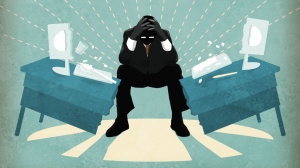Sleep Leadership: 4 Ways To Promote Good Habits And Beat Company Burnout
People need help getting a good night's sleep.

We all have a few sleepless nights from time to time, but Nuffield Health research from its 2022 ‘Healthier Nation Index’, suggests poor sleep is on the rise with nearly three-quarters of its respondents reporting poorer sleep that year. This is especially concerning given it was revealed 10 percent of respondents were only getting between 2-4 hours of sleep per night.
To understand why sleep leadership is essential, it can be useful to look more closely at the impact of poor sleep on your employees.
The physical and mental health repercussions of poor sleep
Everyone has nights of poor sleep occasionally and feels drained and drowsy as a result the next day. However, it’s the continuous loss of sleep and inability to achieve consistent sleep patterns that wear away at employees’ health.
Your body clock helps regulate more than just your sleep and the long-term effects of a misaligned circadian rhythm can pose physical health risks, linked to changes in blood pressure and even certain types of cancer.
In addition to feelings of tiredness, employees are affected by reduced concentration, impaired mobility, and decreased reaction times, which can put those working in manual roles especially at risk of accident or injury.
The relationship between mental health and sleep isn’t entirely understood but according to neurochemistry studies, an adequate night’s sleep helps enhance mental and emotional resilience equally.
Chronic sleep disruptions might generate negative thinking and emotional sensitivity and research suggests poor sleep makes us twice as responsive to stress. It’s also thought treating insomnia may help alleviate the symptoms associated with anxiety and vice versa.
The impact of poor sleep on leadership
We know that poor sleep impacts our teams, but it has a negative effect on leadership styles too. Lack of sleep hinders your ability to employ self-control and makes it more likely you'll overreact, to difficult situations. One study, found when bosses slept poorly, they were more likely to showcase negative behaviours the following day.
Another study found sleep-deprived leaders were more impatient, irritable, and antagonistic, resulting in poor relationships with their teams. Inspiring the teams we lead is important but perceived charisma of leaders decreases by 13 percent when they lose just two hours of sleep.
Leaders can have a negative indirect impact on teamwork through sleep devaluation. This is when managers demonstrate behaviours like sending emails late at night, boasting about working late or praising others that do the same.
The effect this has on our teams is huge. Employees pay attention to these signals and may match their behaviour accordingly.
So, how can we, as individuals, become ‘sleep leaders’ with teams that are well-rested and able to perform their best?
#1 Lead by example
Many businesses tend to overvalue individuals who undervalue sleep. However, for those looking to maximise employee potential and nurture a positive, productive workforce, it’s important to reduce the business and health risks of sleep deprivation.
Employers should outline their expectations from the outset. This means defining working hours and letting employees know they aren’t expected to reply to emails outside of them.
Managers need to lead from the top down here and ensure they are sending the right messages to their teams. Try not to stay late and openly address the myths surrounding sleep and productivity.
Of course, occasionally, senior staff may need to put in some extra work time to meet deadlines or handle urgent issues. But working long hours and not prioritising rest and sleep does not equate to long-term high performance.
Employees should also be encouraged to work around their natural sleep patterns where possible, for example, avoiding scheduling early-morning or late-evening calls.
#2 Prioritise sleep in your wellbeing strategies.
Discuss with HR and other senior departments how to prioritise sleep management in your current health and wellbeing strategies, to complement other elements like nutrition and exercise.
Employees may not even realise they are having difficulties due to their poor sleep, so line managers should receive the right training to recognise the signs and offer support when required. This creates an open dialogue around sleep concerns and shows a discussion about sleep is both welcomed and expected in the workplace and support plans can be created.
#3 Signpost to support.
Where signs of emotional difficulty are identified, employers should signpost individuals towards the relevant emotional wellbeing support available to them. It’s important to note that stress from outside the world of work - like finances, addiction, or family problems - can negatively impact sleep.
Businesses should provide wellbeing support through external services like cognitive behavioural therapy (CBT) , menopause advice hubs, or Employee Assistance Programmes (EAPs). These offer direct, confidential contact with experts who can support individuals who feel their mental health is impacted by poor sleep.
#4 Encourage lifestyle changes outside of work too.
Responsible businesses should try to find ways to encourage lifestyle changes outside of work, to help boost the effects of the internal employee benefits they offer.
For example, emphasising the benefits of exercise in regulating sleep patterns, just not right before bed, as we remain in an ‘activated’ mode for a while after exercising, making it difficult to sleep.
Suggesting an outdoor run or power walk during lunch hours not only gets employees away from their desks but exposes them to natural daylight, promoting healthy sleep hormones.
Running internal talks and inviting health experts to discuss the impact of poor sleep and how to support those experiencing poor sleep, can be beneficial.
For example, you could run a session on sleep hygiene, which focuses on simple habits staff can adopt to improve the quality of their sleep, like establishing a non-negotiable bedtime routine and limiting their use of electronics when the working day is over.
Gosia Bowling is National Lead for Mental Health at Nuffield Health.
Thanks for signing up to Minutehack alerts.
Brilliant editorials heading your way soon.
Okay, Thanks!

